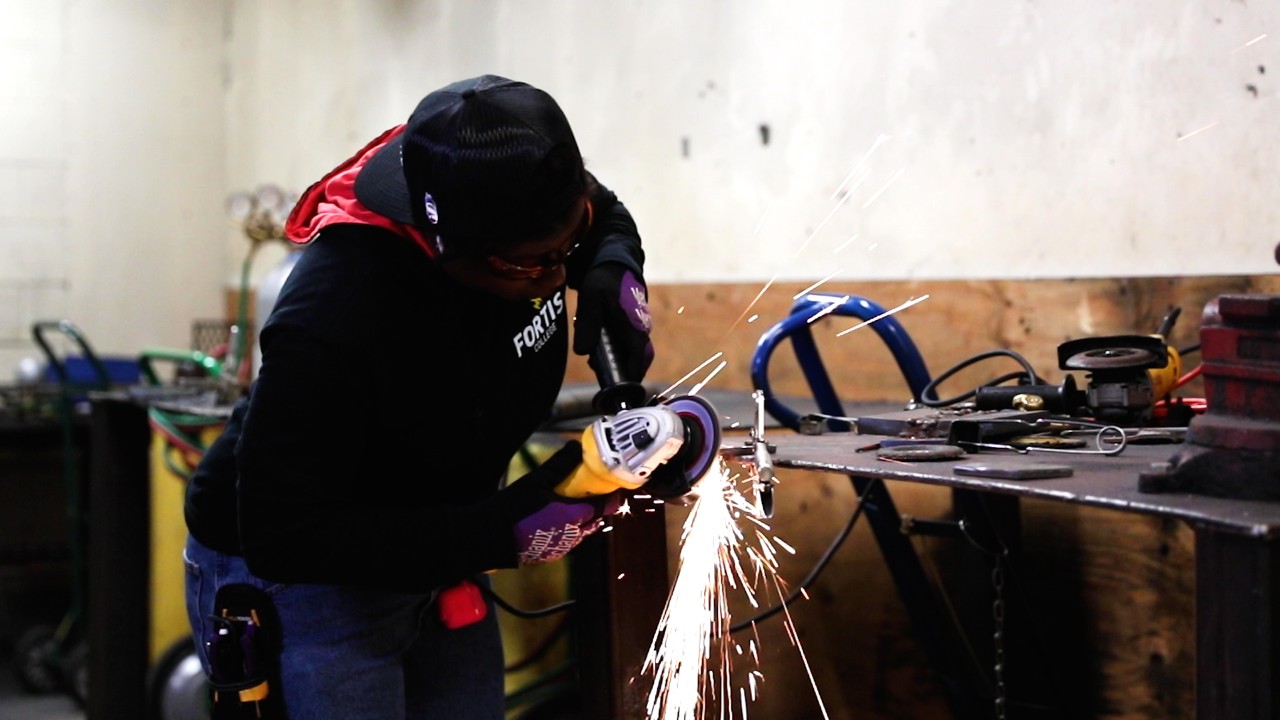Welding is a trade that involves using specialized tools and techniques to fuse various metals. Welders typically work in construction, the automotive industry, aerospace, shipping and rail, and commercial maintenance.
Welding has been around for thousands of years. Early welding techniques were employed to fashion tools, lap joints, and weaponry. In the modern age, welding is used in building train tracks, creating electrical systems, assembling aircraft, constructing commercial buildings, and much more.
Because welding has broad applications across many industries, it is one of the most popular skilled-based roles among non-college graduates. Career-minded individuals who are drawn to the trades may consider how long it takes to become a welder.
Explore the welder career path, including typical job duties and responsibilities, and learn about education and training, such as how skilled trade school programs help develop essential welding skills.
Welder Job Duties and Responsibilities
Welders work in a variety of environments and may use a range of different welding processes throughout their careers. Some welders work exclusively with jewelry, including rings, bracelets, and necklaces. By comparison, pipefitters work with piping systems that transport steam, fuel, chemicals, and water.
The duties of a welder may include:
Studying project blueprints and engineering drafts
Operating and maintaining welding equipment
Inspecting structures that require welding solutions
Participating in safety training
Adjoining metals
Smoothing and polishing metals
Repairing metal seams
Filling metal holes
Applying protective metal coatings
Inspecting metalwork for flaws and compliance issues
Performing quality assurance
How Long Is Welder Training?
Trade schools that are dedicated to teaching welding can be completed in approximately one to two years. Unlike a traditional university, trade schools feature no core coursework, meaning time in the classroom is entirely devoted to welding. Common welder skills and competencies taught in welding school include:
Blueprint reading
Metallurgy
Oxy-acetylene and semi-automatic cutting
Brazing
Industry-standard welding processes
Welding school students learn to work with stainless steel, aluminum, brass, cast iron, and alloy metals. Upon completion, students gain a diverse welding skill set and knowledge of working with various metals. Additionally, they receive a certificate of completion, which they can use to demonstrate their formal training with potential employers.
Apprenticeship programs are another option for aspiring welders. Although many apprenticeship programs provide a salary, one major drawback is their length. According to ZipRecruiter, welding apprenticeship programs take approximately three to four years to complete, combining classroom instruction and job training. This timeline varies depending on the program’s requirements and if the apprenticeship is full or part-time.
Although professional certification is optional, it’s recommended for welders who wish to increase their earning potential and broaden their employment opportunities. As one of the nation’s leading welding organizations, the American Welding Society is an issuing body for several welding certifications, including:
Certified Welding Inspector (CWI)
Certified Welding Supervisor (CWS)
Certified Welding Engineer (CWENG)
Certified Robotic Arc Welding (CRAW)
Certified Welder
Benefits of Becoming a Welder
As one of the longest-running skilled positions in the workforce, there are several benefits to becoming a welder. Here are some of the most noteworthy.
Welders are in demand across several industries
Skilled welding positions offer competitive salaries
Welding offers significant opportunities for advancement
Welding is ideal for those who prefer hands-on, skilled-based work
Welding is a transferable skill, meaning it can be done anywhere in the world
Welding provides the opportunity to work in numerous environments
There are a wide range of types of welding careers. Production welders, for example, primarily work in the manufacturing and construction industries fusing different types of metal materials. Metal fabricators create sculptures, vehicles, and custom work using their expertise in welding raw materials. Boilermakers work with steel, iron, and copper to construct and maintain industrial boiler systems. The field of welding is so broad that welders may choose to work with products or in industries that interest them.
How to Start Your Career as a Welder
Welders play a critical role in developing commercial infrastructure, building aircraft and automobiles, restoring bridges and railways, and much more. This line of work is highly rewarding for those who take pride in creating things people use in their everyday lives. Additionally, welding affords the opportunity to perform in a role that values skill, technique, and intimate knowledge of how metals react to heat.
How long it takes to become a welder depends entirely on your educational path and the type of welding career you pursue. Fortis offers a Welding Technology training program that is led by knowledgeable instructors who bring years of experience working with a variety of metals, welding tools, and specialized techniques. The 48-week training program is a great choice for aspiring welders who want to establish a foundational knowledge of the trade they can build on once they’ve entered the workforce.
Find out how Fortis can support your professional goals of learning a skilled trade.
Recommended Readings
4 Essential Welder Skills
Certified Welding Inspector: Career Overview
5 Types of Welding Jobs


